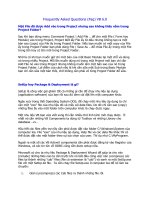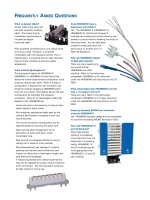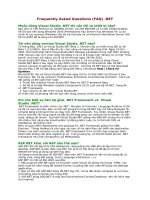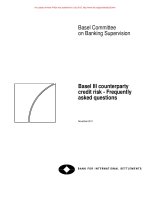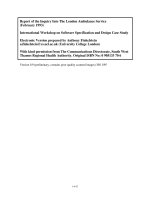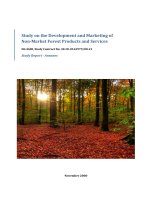Frequently asked questions on anti bribery and corruption
Bạn đang xem bản rút gọn của tài liệu. Xem và tải ngay bản đầy đủ của tài liệu tại đây (2.39 MB, 586 trang )
Frequently Asked Questions
in
Anti-Bribery and Corruption
Frequently Asked Questions
in
Anti-Bribery and Corruption
David Lawler
A John Wiley & Sons, Ltd., Publication
This edition first published in 2012
Copyright ©2012 David Lawler
Registered office
John Wiley & Sons Ltd, The Atrium, Southern Gate, Chichester, West Sussex, PO19 8SQ, United
Kingdom
For details of our global editorial offices, for customer services and for information about how
to apply for permission to reuse the copyright material in this book please see our website at
www.wiley.com
The rights of David Lawler to be identified as the author of this work have been asserted in
accordance with the Copyright, Designs and Patents Act 1988.
All rights reserved. No part of this publication may be reproduced, stored in a retrieval system,
or transmitted, in any form or by any means, electronic, mechanical, photocopying, recording
or otherwise, except as permitted by the UK Copyright, Designs and Patents Act 1988, without
the prior permission of the publisher.
Wiley publishes in a variety of print and electronic formats and by print-on-demand. Some
material included with standard print versions of this book may not be included in e-books or
in print-on-demand. If this book refers to media such as a CD or DVD that is not included in
the version you purchased, you may download this material at . For
more information about Wiley products, visit www.wiley.com.
Designations used by companies to distinguish their products are often claimed as trademarks.
All brand names and product names used in this book are trade names, service marks, trademarks or registered trademarks of their respective owners. The publisher is not associated with
any product or vendor mentioned in this book. This publication is designed to provide accurate
and authoritative information in regard to the subject matter covered. It is sold on the understanding that the publisher is not engaged in rendering professional services. If professional
advice or other expert assistance is required, the services of a competent professional should
be sought.
Library of Congress Cataloging-in-Publication Data is available
ISBN:
ISBN:
ISBN:
ISBN:
ISBN:
978-1-119-97197-9
978-1-119-96057-7
978-1-118-40105-7
978-1-118-35981-5
978-1-119-96058-4
(pbk)
(ebk)
(custom pbk)
(ebk)
(ebk)
A catalogue record for this book is available from the British Library.
Typeset in 9/10.5pt Cheltenham-Book by Laserwords Private Limited, Chennai, India
Printed in Great Britain by TJ International, Padstow, Cornwall
To Cathy and Harry
for putting up with this, and me.
Contents
About the Author
Acknowledgements
Bribery Acronyms and Terms, and a Quick Index
xiii
xv
xvii
Introduction
1
1
Timeline
5
2
Who Pays Bribes?
19
3
What Are the Key Sets of Rules that Govern
International Bribery?
69
4
Frequently Asked Questions
97
5
How Do I Set Up Proportionate Yet Effective
Anti-Bribery Compliance Procedures?
343
How Do I Carry Out a Review to Detect
and Deter Bribery?
405
Cautionary Tales – What Happens If You
Get Caught?
433
8
What Are My Predictions for 2012 and Beyond?
455
9
Appendices
483
References
525
Get the Text of the Statutes on Your Smartphone
from the Following QR Codes
545
Do I Need to Read this Book (Again)?
547
Index
549
6
7
Frequently Asked
Questions
1. Is Bribery the Same as Corruption?
98
2. Why Is Corruption Bad?
103
3. When Does a Gift Become a Bribe?
111
4. If I Pay Someone a Commission, Am I Committing
a Bribery Offence?
115
5. What Are the Causes of Corruption?
117
6. Who Polices and Prosecutes International
Bribery?
123
7. What Is the Difference in Focus Between the
DOJ and the SEC?
134
8. Why All the Fuss About the Bribery Act?
138
9. Is the Bribery Act Stricter Than the FCPA?
144
10. Who Is Covered by What? The Scope of the
Various Laws
151
11. Are Companies Liable for Bribes Paid by Their
Employees, Agents, Subsidiaries and Affiliates?
157
12. Can a Parent Company be Liable Under
the FCPA for Accounting Violations Committed
by an Affiliate or Subsidiary?
167
13. Can Company Managers be Personally Liable
for Bribery?
169
x
Frequently Asked Questions
14. Does the Bribery Act have Retrospective
Application?
173
15. Who Are Foreign Officials?
175
16. What Are the Affirmative Defences and Exceptions
Under the FCPA?
183
17. Can I Do Business in Some Parts of the World
Without Paying Bribes?
188
18. Are Facilitation Payments Legal?
191
19. Can I Obtain Guidance About Whether My
‘Novel’ Marketing Scheme will be Viewed
as Bribery?
197
20. What Are the Penalties for Bribery Under the
FCPA?
200
21. What Are the Penalties for Bribery in the UK?
208
22. How Is an Actual FCPA Fine Calculated? Worked
Example: BAE Systems
214
23. How Is Disgorgement Calculated?
219
24. What Happens to Fines and Penalties Paid to
Settle Bribery Actions?
233
25. How Does a Settlement or Plea Agreement
Work? Part 1: The US Experience
238
26. How Does a Settlement or Plea Agreement Work?
Part 2: The Holder, Thompson and McNulty
Memos, the Filip Principles, and the Seaboard
Decision
244
27. How Does a Settlement or Plea Agreement Work?
Part 3: The UK Experience
248
28. What Is a Compliance Monitor?
261
29. What Is Debarment?
272
Frequently Asked Questions
xi
30. How Much Does It Cost to Fully Respond to an
International Bribery Investigation and
Prosecution?
277
31. When Do Old Bribes Become Ancient History?
279
32. Should I Self-Report?
282
33. How Do the Money Laundering Laws Change
the Approach to Self-Disclosure in the UK?
289
34. What Is Privilege and Why Is It Important?
294
35. Can I Acquire Bribery Problems During a
Corporate Takeover?
304
36. What Do I Do If I Discover a Potential Bribe?
309
37. I’ve Just Received a ‘Section 2’ Notice.
What Do I Do?
314
38. Do I Share in the Fine If I ‘Blow the Whistle’
on My Employer?
319
39. How Can I Deter Bribery?
326
40. What Accounting Records Must I Keep?
331
41. What Are the Main ‘Red Flags’ of Bribery?
335
42. Are Any of My Employees Receiving Kickbacks
from Suppliers?
337
43. How Can I Stay Up To Date?
342
About the Author
David Lawler specializes in resolving complex and high risk
financial and investigative problems. His clients range from
individuals to multinational groups, many of whom are under
investigation by regulators or prosecutors or are involved in
disputes.
An expert in using database and visualization techniques to
find needles in massive data haystacks, he has conducted
bribery reviews in Asia, Africa, the Middle East, the Former Soviet Union and Europe. He has helped numerous
companies design and test their anti-bribery compliance
systems and negotiate the penalties when things have gone
wrong. An experienced accountant, he has also been called
on to provide expert evidence to courts and arbitration
tribunals on questions of corporate governance, solvency,
and profitability.
Dr Lawler gained his first degree at Durham University, and
his PhD from the University of London. He is a Fellow of the
Institute of Chartered Accountants in England and Wales,
a Certified Fraud Examiner, a Member of the Academy of
Experts and an accredited commercial mediator. He is currently based in London.
Acknowledgements
I am grateful to many people for help, both direct and indirect, during the evolution of this book.
I could not possibly name everyone who has contributed to
my understanding of the subject, but I would particularly
like to thank all my friends and colleagues at FRA. Their
work helped extend my involvement in this fascinating field,
and motivated me to write this book. Their own research,
comments and questions have enlightened, supported and
encouraged me. Particular thanks are also due to several
corporate clients who, for obvious reasons, do not want their
involvement with a bribery specialist to be made public.
In addition I would like to thank all those regularly writing
about bribery and corruption who have shared their ideas
over the years. I would be remiss if I did not mention at
least Carolyn Lindsey and the rest of the team at Trace
International who put together the Trace Compendium
of cases ( />Compendium.html); Mary Jacoby (njustice
.com/justanticorruption); Richard Cassin (ablog
.com); Mike Koehler ();
Barry Vitou (www.thebriberyact.com); Howard Sklar
() and Tom Fox
().
The book would never have come together without the team
of editors at John Wiley, in particular Jenny McCall who
first approached me to write this, and Gemma Valler and
Grace O’Byrne who saw the project through to completion.
I’m grateful to Viv Croot for her comments on the draft
xvi
Acknowledgements
manuscript, and to Rhory Robertson for his support and
perceptive advice.
For indulging my long nights and weekends at the computer,
when they thought I was playing rather than working, I’d like
to thank Cathy and Harry.
Without doubt there will be errors, omissions and oversimplifications, for which I take absolute responsibility,
while hoping that the rest of the material will be enough to
stimulate some insights and above all, some action.
Bribery Acronyms
and Terms, and a
Quick Index
• FCPA: The US Foreign Corrupt Practices Act 1977. (See ‘An
essential summary of the FCPA’, page 73.)
• The Bribery Act: The UK’s Bribery Act 2010, which finally
•
•
•
•
came into effect on 1 July 2011. (See ‘An essential summary
of the Bribery Act’, page 81.)
The Bribery Act Guidance: The Ministry of Justice
publication Guidance about Procedures which Relevant
Commercial Organizations Can Put into Place to Prevent
Persons Associated with Them from Bribing (Section 9 of the
Bribery Act 2010), which was published to coincide with the
Bribery Act coming into effect. (See ‘An essential summary
of the Bribery Act’, page 81, and Question 8.)
The OECD Convention: The Organization for Economic
Cooperation and Development’s Convention on Combating
Bribery of Foreign Public Officials in International Business
Transactions Convention, which came into effect in
February 1999. (See ‘An essential summary of the OECD
Convention’, page 93.)
The Sentencing Guidelines: The US Federal Sentencing
Guidelines set out a uniform sentencing policy for
individuals and organizations convicted of felonies and
serious misdemeanours (including bribery) in the US. (See
Questions 20 and 22.)
DOJ: The US Department of Justice, responsible for
enforcing the anti-bribery provisions of the FCPA.
xviii
Bribery Acronyms and Terms, and a Quick Index
• SEC: The US Securities and Exchange Commission,
•
•
•
•
•
•
•
•
•
•
responsible for overseeing the capital markets and
enforcing the accounting provisions of the FCPA against
companies listed on the US stock markets.
SFO: The Serious Fraud Office, the lead agency in England,
Wales and Northern Ireland for investigating and
prosecuting cases of domestic and overseas corruption.
FSA: The UK’s Financial Services Authority, the
independent body that regulates the financial services
industry in the UK. (For more on all of these see
Question 6.)
TI: Transparency International, a global organization
leading the fight against corruption. TI members in more
than 90 countries include government, business and the
media. They promote transparency in elections, public
administration, procurement and business. The annual TI
Corruption Perceptions Index (CPI) ranks countries in
terms of perceived levels of corruption. (See ‘Where is
bribery most prevalent?’, page 25.)
TRACE International: A non-profit membership association
that provides due diligence, compliance assistance and a
great online Resource Centre with law and case summaries.
For more information, go to (https://
secure.traceinternational.org/Knowledge/
Compendium/Welcome.html).
DPA: A US deferred prosecution agreement.
NPA: A US non-prosecution agreement (see Question 25).
CRO: A UK civil recovery order (see Question 27).
CCO: A company’s chief compliance officer (see ‘Three
essential prerequisites’, page 352).
POCA: The UK’s Proceeds of Crime Act 2002.
SOCA: The UK’s Serious Organised Crime Agency (see
Question 33).
Introduction
‘Few men have virtue to withstand the highest bidder.’
George Washington
Bribes can vary tremendously in both their size, and their
nature. Suitcases filled with notes and given to African presidents to secure a multi-million pound contract are invariably
bribes, but bribes can also be backhanders to reward a friend
for passing some business your way, or small denomination
notes tucked into a passport at a makeshift checkpoint on
a deserted central European road. All are technically bribes
perhaps – but some bribes just feel more wrong than others.
So-called ‘grand corruption’ – money paid to win major deals,
change government policy, and secure venues for sporting
events – grabs the headlines and is seen as causing the greatest social harm. It’s well correlated with stunted economic
growth and higher levels of poverty, and it’s rightly where
prevention and deterrence are focused. Most people agree
that grand corruption is wrong, and people who engage in it
should be severely punished.
But small ‘facilitation’ or grease payments to obtain basic
services from minor government functionaries are far more
prevalent. These types of bribes are generally extorted:
people don’t pay them to get any special treatment, but
pay them simply to get what they are entitled to. (Whether
they subsequently admit it or properly report it is another
matter.) Although business groups continue to take a
pragmatic approach and argue that it is simply impossible
to do business in lesser-developed countries without paying
2
Frequently Asked Questions in Anti-Bribery and Corruption
bribes, agreeing to make facilitation payments can be seen
as the thin end of the wedge and surely fosters a culture of
corruption among government officials. Is it, therefore, far
from a victimless crime?
But even before we get onto these sorts of discussions, we
need to consider what bribery and corruption really are, and
just why they are so bad. Why is slipping a few pounds to
a London restaurant manager to obtain a better table seen
as acceptable (even admirable) behaviour, but slipping far
less money to a customs official in Lagos likely to reward you
with a lengthy spell in prison?
The regulatory environment and enforcement regime is getting ever stricter. US prosecutors are regularly fining both US
and non-US companies hundreds of millions of dollars, and
UK lawyers have talked themselves into a frenzy about the
Bribery Act. But is the Bribery Act really stricter than the US
Foreign Corrupt Practices Act (FCPA)? What does it say, and
how will it be enforced? Working in a global company, exactly
what am I allowed and not allowed to do?
There are two types of oil services companies: those that
have already been investigated for bribery violations and
those that are going to be investigated for bribery violations.
Most companies have already heard about how they should
take notice of global bribery laws, and are starting to do so.
Most of the multinationals that have already been caught
out by the FCPA have now developed a decent compliance
regime. Other companies may have some sort of an antibribery compliance policy, but for many it’s there in name
only. Several have stalled along the way and got bogged
down in what can seem like a daunting and unrewarding
compliance quagmire, and are paying vast amounts of money
to the biggest and brightest legal and accounting firms to tell
them what should be blindingly obvious. The UK’s Ministry of
Introduction
3
Justice has published guidance that is meant to tell business
all they need to do to comply with the Bribery Act. But it
doesn’t.
In fact there is very little guidance available that tells business managers, in digestible, succinct, but above all practical
terms, what the key bribery laws say, what happens (and
what you should do) if someone accuses you of breaking
them, and how you can have a great compliance system without spending a fortune.
This book is what I wish that I had been given when I was
starting out helping companies address their bribery concerns. It tries to give direct answers to the above questions
and many other difficult ones that I am frequently asked by
corporate counsel, external lawyers, internal auditors, corporate accountants, compliance specialists, HR specialists,
fellow forensic accountants and just normal business people
who have heard about bribery, realize they need to address it
and are asking the question ‘But what should we actually do?’
This is not a law book (although by necessity it contains
some law). Neither is it an FCPA or a Bribery Act book. I’ve
tried instead to make it relevant to business people working internationally. As such, and although I deal with other
key jurisdictions – notably China, and some African and European countries – I’ve focused on the laws and enforcement
regimes that are most relevant to businesses operating globally in 2011, which are those of the US, the UK and the OECD.
I also move beyond business and consider bribery in sport,
politics and the media.
The mainstay of the book though is practical advice to help
business people start, and improve their anti-bribery compliance. The main problem when faced with setting up or
improving a compliance regime is knowing where to begin. In
this book I set out some simple and common-sense steps that
can take a company from having no compliance regime to
4
Frequently Asked Questions in Anti-Bribery and Corruption
being FCPA, Bribery Act and OECD compliant. (And if you’re
compliant with these, you can sleep easy at night wherever
you may be based.)
Further reading
This book is not an academic work, designed to contain all
you need to know about a topic. Quite the contrary. I hope it
will provide an introduction for some and refresher for others of the things they need to know, and act as a jumping-off
point for further research. For each topic I have therefore set
out some suggested further reading, both in this book and
externally. I have not referenced everything, or put references
in standard academic format (it’s just not that sort of book),
but what I have done is provided links to some articles that I
think are particularly relevant and interesting.
I have attached the URLs of many sources for further reading.
I have also set out URLs as bitly web addresses. (Bitly is
a URL-shortening service, which avoids you having to
retype long website addresses.) Just direct your browser to
where xxxxx is the permanent combination
of four to six letters and numbers given in the text (they are
case-sensitive), and you will be taken straight to the relevant
website.
One final note: I am writing this from London, and so
throughout the book I use UK spelling and terminology.
I hope that everyone who ever has to get to grips with
how client entertaining needs to be ‘proportionate’ and
‘reasonable’ will appreciate this book.
David Lawler PhD, FCA, CFE
London, January 2012
Chapter 1
Timeline

